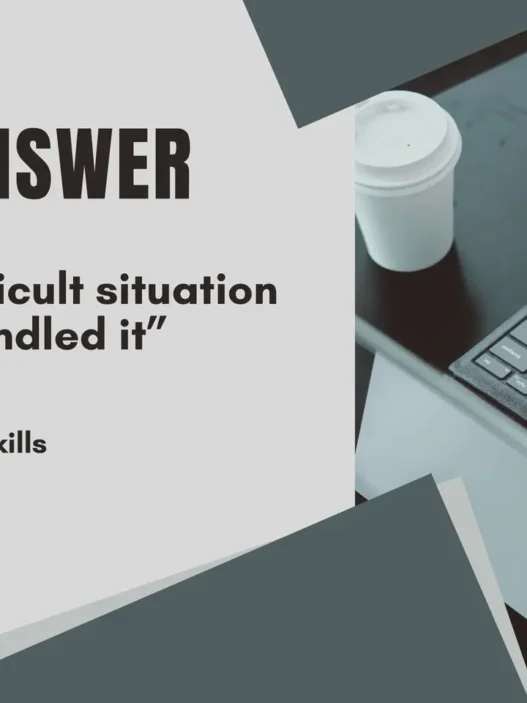When an employer asks you about your weaknesses during an interview, it’s not necessarily a trick question. Rather, they’re seeking insight into your self-awareness, honesty, and commitment to personal development. Your response offers a chance to showcase how you are proactively improving and managing your weaknesses. Let’s dive into the best ways to approach this question, with example answers that reflect growth and initiative.
Why Do Employers Ask “What Are Your Weaknesses?”
Employers use this question to gauge how well you understand your limitations and whether you are committed to growing professionally. Your answer can help them evaluate whether you’re capable of recognizing areas for improvement and what steps you’re taking to overcome challenges. By providing specific examples of how you’re working to address your weaknesses, you’ll demonstrate your self-awareness and ability to adapt.
Top 10 Weaknesses to Mention in an Interview (And How to Frame Them)
To help you craft the perfect response, here are 10 common weaknesses that, when framed correctly, can turn into strengths:
1. I Focus Too Much on the Details
Being detail-oriented is a valuable skill, but it can also be a double-edged sword. If you get bogged down in the specifics, it could slow you down or make you lose sight of the bigger picture.
Example Answer:
“One of my weaknesses is that I sometimes focus too much on the details of a project. While being detail-oriented helps ensure high-quality work, I’ve learned that I need to manage my time better to avoid spending too long on small aspects. To address this, I’ve been working on setting time limits for tasks, allowing me to maintain a focus on the larger objectives and deadlines.”
2. I Have a Hard Time Letting Go of a Project
Perfectionism is a common trait, but it can hinder your ability to wrap up tasks. If you find yourself making constant revisions, this may impact your productivity and delay deadlines.
Example Answer:
“My biggest weakness is that I sometimes have difficulty letting go of a project, especially when I feel it’s not perfect. I tend to make revisions until I’m completely satisfied with every detail. To manage this, I’ve implemented a strategy of setting strict deadlines for revisions, ensuring I don’t overanalyze or make unnecessary last-minute changes.”
3. I Have Trouble Saying No
While being willing to help colleagues is admirable, overcommitting can lead to burnout and missed deadlines. It’s important to balance helping others with managing your own workload.
Example Answer:
“I often have trouble saying no, which can sometimes lead me to take on more than I can handle. To overcome this, I’ve started using a project management tool that helps me visualize my workload. This has allowed me to better assess when I have the capacity to assist others and when I need to set boundaries.”
4. I Feel Stressed When Projects Run Beyond the Deadline
A strong desire to meet deadlines is a positive trait, but it can cause stress when things go off track. Employers appreciate individuals who are dedicated to delivering work on time, but they also want to see that you’re managing your stress effectively.
Example Answer:
“I feel quite stressed when projects run past their deadlines. I’m committed to delivering work on time, and missing a deadline can be very unsettling for me. To cope, I’ve taken up mindfulness techniques, which help me manage stress and stay focused on completing tasks without letting pressure affect my performance.”
5. I Could Use More Experience in [Skill/Area]
Acknowledging areas where you could gain more experience shows humility and a willingness to learn. However, avoid mentioning skills critical to the role you’re applying for.
Example Answer:
“One area I’m focusing on improving is my public speaking skills. While I’m comfortable in small group settings, I’m working on becoming more confident when speaking in larger forums. I’ve signed up for public speaking workshops and have been practicing presenting in front of groups to improve.”
6. I Sometimes Have Trouble Asking for Help
While being independent can be a valuable trait, there are times when asking for help can lead to more efficient outcomes. Being able to recognize when you need assistance shows maturity.
Example Answer:
“Because I’m very independent, I sometimes struggle with asking for help. I tend to try and solve problems on my own, but I’ve come to realize that collaborating with others can often lead to better solutions. I’m working on asking for help when needed, and it’s improved both my work quality and efficiency.”
7. It’s Difficult for Me to Work with Certain Personalities
Teamwork can be challenging, especially when personalities clash. Acknowledging this weakness and demonstrating how you work to manage differences can make you seem adaptable and open-minded.
Example Answer:
“I’ve found that I sometimes struggle to work with colleagues who have very dominant or outspoken personalities. However, I’ve been proactive in trying to understand their communication styles and adjusting my approach. By doing this, I’ve been able to build stronger working relationships and contribute more effectively to group projects.”
8. I Sometimes Struggle to Maintain Work-Life Balance
A commitment to your job is admirable, but neglecting personal time can affect your long-term productivity and well-being. Showing that you’ve learned to balance work and life can demonstrate growth.
Example Answer:
“I tend to get absorbed in my work, sometimes to the detriment of my personal life. To improve my work-life balance, I’ve started scheduling time for family and hobbies. These breaks have not only helped me recharge but also improved my focus and productivity at work.”
9. In the Past, I Have Been Uncomfortable with Ambiguity
Some people thrive in structured environments, while others excel in uncertain situations. If you struggle with ambiguity, showing how you’re addressing this challenge can highlight your adaptability.
Example Answer:
“I tend to feel uneasy when faced with ambiguity or unclear instructions. To overcome this, I’ve developed a structured approach to ambiguous tasks, including doing more research and seeking input from colleagues when needed. This has helped me navigate uncertainty with more confidence and clarity.”
10. I Sometimes Lack Confidence
Lack of confidence can hold you back, but it’s a weakness that can be improved with practice and support. Demonstrating the steps you’ve taken to increase your confidence can be a strong positive.
Example Answer:
“I’ve occasionally struggled with confidence, especially in group settings. To work on this, I’ve attended public speaking courses and regularly push myself to take on leadership roles in meetings. These efforts have helped me become more confident in expressing my ideas and leading teams.”
Conclusion: Turn Your Weakness into a Strength
When responding to the “What are your weaknesses?” question, the key is to show that you’re self-aware, willing to grow, and actively working to improve. By framing your weaknesses in a positive light and providing concrete examples of how you’re addressing them, you’ll demonstrate that you’re both honest and proactive—qualities that any employer values. Remember, the goal is not to have no weaknesses but to show how you’re overcoming them to become a better professional.
By using these strategies, you’ll not only answer the question effectively but also position yourself as a candidate who can turn challenges into opportunities for growth. Ready to take the next step? Start preparing for your interview today and make a lasting impression!


















